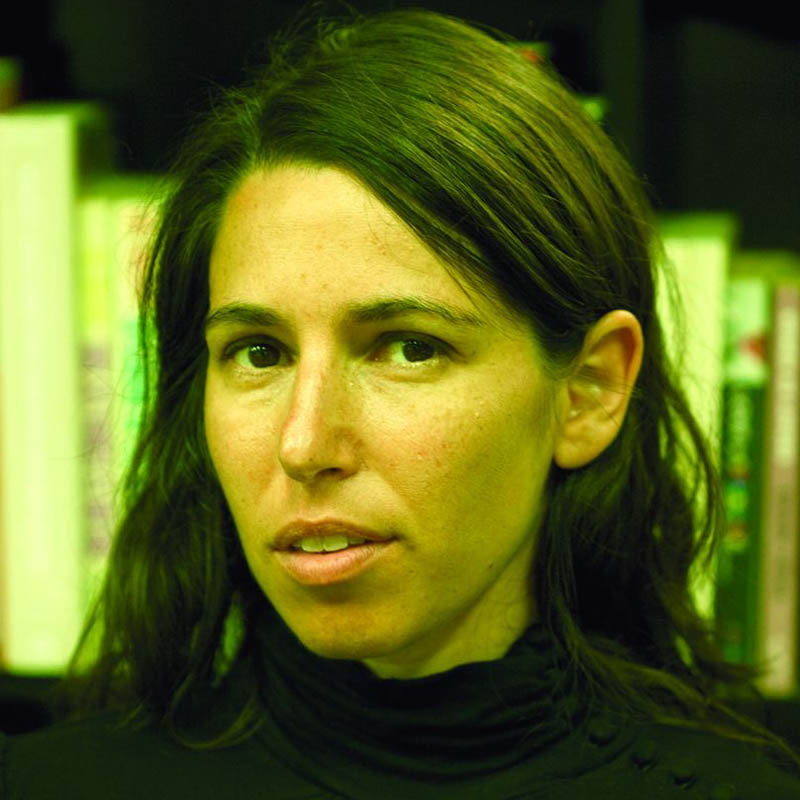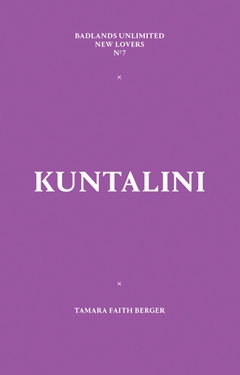RUSTY TALK WITH TAMARA FAITH BERGER
I feel more powerful now than I ever did. Jacqueline: I’m a big fan of Taxi Driver and of lonely man movies, but I’m also very interested in lonely women movies. I feel so much anger, tension. When I read something like Kuntalini, I think, you totally understand what I’m going through. A big sexual awakening that is our own Taxi Driver. Is that the sort of stuff that influences you? Tamara Faith Berger: Yeah. I personally have a lot of unexpressed anger myself. That is also what I want too. There are a few movies like that and you’ll have to tell me what movies you’re watching that are good like that. I sometimes see movies that have more Taxi Driver or even adventure. It’s like an adventure story, right? Getting something out that we don’t normally see and it wants to be in public. I don’t think this could purely happen in public. It has to be ratcheted up a couple of notches. Maybe one day... I don’t know. I want to see things played out that I don’t see. It’s like in a dream. I just actually took a self-defense course for women and I had never done that. It was amazing. JV: Reminds me of the danger aspect in the book. TFB: I guess, that book, Kuntalini, ignores danger and I know danger exists. But I like that I can make this little story where a female can do whatever she wants, and get in a car with a bunch of guys and have a good time. JV: The way you wrote it was very surreal in that respect. TFB: Because of the danger, you mean? JV: Yeah, the danger. Because you fantasize about stuff like that, but you don’t really play it out. I mean, maybe, you have times when you actually do, but you’ve still placed yourself in a very vulnerable position. I feel like a lot of Toronto-based female writers like yourself write from a surrealist, magic realism perspective, like it is its own genre. Writers like Lynn Crosbie and Liz Worth. Is it something that comes to you? TFB: I’ve never really been a realist per se, but I want things to be possible. I kind of go from reality and then something gets a bit too intense, but I still want to make it happen. I also don’t want to leave the realistic world. I can see that it’s like a genre, like you say, but I also don’t want it to be too surrealistic. JV: What I find now, especially with your writing is that there’s an undercurrent of not just sexual revolution, but an actual revolution going to happen. I feel like women are finally going to just put everything down and start yelling, “Fuck this shit. We’re taking over,” and overthrow the powers that be. When’s the revolution happening, Tamara? TFB: I feel like it’s a slow transitioning of power. There are some women and female artists that are way on the edge of us. I find that really inspiring. There’s this woman, I don’t know if you’ve heard of her, Fannie Sosa. She does dance and workshops. The stuff that comes out of her mouth about worshipping women—I don’t want to paraphrase what she is doing, just look her up. JV: I’ve been re-reading a lot of ’80s feminist texts, which deal with a lot of more new age-y sort of stuff. Right now it’s Descent of the Goddess by Sylvia Brenton Perera. It talks about working through traumas through a Sumerian goddess myth. TFB: Fannie Sosa is kind of like that, worshipping the cunt, but she spells it “khunt.” It’s pretty deep what she’s talking about with women and the patriarchy and getting rid of it. There’s a lot of that now, like the eighties and nineties. There’s that large one too, When God Was Woman by Merlin Stone. JV: A lot of this new age-y stuff makes sense though beyond logic. Maybe we have to go crazy. Maybe we have to decolonize. Maybe we have to take men out of the equation and rebuild. TFB: I’m 44 and I like to think that I’ve come this far and men don’t have so much power over me anymore. I feel more powerful now than I ever did. JV: There was this article called Rhythms of Fear by Laura Maw in Hazlitt. It talked about how cities, in their networks and architecture, aren’t built for women and that’s why they are so dangerous for women. Do you feel like you are not wanted in a city space or a street wasn’t meant for you? TFB: Yeah, I think so. Jacqueline: And in your writing? TFB: It was easier to do it with this book because I could bullet through the chapters because it’s short. It’s like when she goes down into Niagara Falls and no one, really, is supposed to go down to Niagara Falls like the character does. That’s probably the most fantastical section in Kuntalini. I wanted Niagara Falls to be what I wanted it to be. JV: And when she just starts walking along the highway with no regard to her safety. She’s trespassing a very unnatural space not made for her body in mind. I think what I find great about your work and the genre you write is that it used to be that porn was written for a certain point, an ends to means. Your writing includes politics and subversion. I was reading it and felt both stimulating and in need revolutionizing. It was inspiring. TFB: It’s like excitement [...] like pornography, not that Kuntalini is porn, [..] but I also see it like propaganda. That’s why I find it very powerful to work in it. I can put out what I want to put out. I also write screenplays and it’s a bit difficult there because they usually place the woman in bad behaviour situations. But it’s just that, bad behaviour. I want to see it played out. JV: Why do you think they say it’s bad behavior? TFB: I don’t know. I mean, yeah, she’s masturbating in the taxicab and someone offered her coke and she did it. But she was still the master of her own world. JV: Yeah, because if a guy did that in a book or in a movie, it would be considered artistic and part of the character’s ethos. TFB: I think in other worlds like film, people don’t think that a female going about her day in a certain way and trying to get something done is a story enough. I think that for adventure narratives, for lack of a better word, we see a Tomb Raider kind of Angelina Jolie character kicking butt, but not in a super sexual way. We don’t see that kind of adventure story for females. I think it’s good to put it in people’s minds—it’s excitement. TAMARA FAITH BERGER'S LATEST BOOK |
| Eat ass, pray, love. Twenty-five year-old Yoo-hoo experiences a sexual awakening in her yoga class. She breaks up with her boyfriend and travels to Niagara Falls where she meets a cold fish teen prostitute and an ex-Army troglodyte deep in the falls. Yoo-hoo’s unforgettable yogic journey sweeps across the realms of asana, hysteria, enlightenment. Kuntalini by Tamara Faith Berger is one of the New Lovers, a series of short erotic fiction published by Badlands Unlimited. Inspired by Maurice Girodias’ legendary Olympia Press, New Lovers features the raw and uncut writings of authors new to the erotic romance genre. Each story has its own unique take on relationships, intimacy, and sex, as well as the complexities that bedevil contemporary life and culture today. |
Rusty Talk
Rusty Talk Editor:
Adèle Barclay
The Rusty Toque interviews published writers, filmmakers, editors, publishers on writing, inspiration, craft, drafting, revision, editing, publishing, and community.
Unless otherwise stated all interviews are conducted by email.
Our goal is to introduce our readers to new voices and to share the insights of published/ produced writers which we hope will encourage and inspire those new to writing.
Archives
November 2017
February 2017
October 2016
September 2016
August 2016
June 2016
May 2016
April 2016
February 2016
January 2016
December 2015
October 2015
August 2015
July 2015
June 2015
March 2015
January 2015
December 2014
September 2014
August 2014
July 2014
May 2014
March 2014
December 2013
November 2013
October 2013
September 2013
May 2013
March 2013
February 2013
December 2012
November 2012
October 2012
September 2012
August 2012
July 2012
June 2012
May 2012
April 2012
March 2012
February 2012
January 2012
December 2011
November 2011
October 2011
September 2011
August 2011
Categories
All
Activist
Adele Barclay
Alex Carey
Alex Leslie
Amelia Gray
Andrew F. Sullivan
Ania Szado
Artist
Author
Bill Bissett
Bob Kerr
Bonnie Bowman
Brian Joseph Davis
Carolyn Smart
Cartoonists
Catherine Graham
Children
Christian Bok
Comedians
Cornelia Hoogland
Daniel Zomparelli
Danis Goulet
David Groulx
David Hickey
David Whitton
Dina Del Bucchia
Directors
Documentary
Editors
Elisabeth Harvor
Elizabeth Bachinsky
Emily Schultz
Erin Moure
Experimental
Fiction Writers
Filmmakers
Francisca Duran
Gary Barwin
Glenn Patterson
Griffin
Griffin Poetry Prize
Heather Birrell
Hoa Nguyen
Iain Macleod
Illustrators
Interview
Ivan E. Coyote
Jacob Mcarthur Mooney
Jacob Wren
Jacqueline Valencia
Jane Munro
Jeffrey St. Jules
Jennifer L. Knox
Julie Bruck
Karen Schindler
Kevin Chong
Laura Clarke
Laurie Gough
Linda Svendsen
Lisa Robertson
Lynne Tillman
Madeleine Thien
Maria Meindl
Marita Dachsel
Matt Lennox
Matt Rader
Media Artists
Michael Longley
Michael Robbins
Michael Turner
Michael Vass
Michael V. Smith
Mike Watt
Mina Shum
Mira Gonzalez
M. NourbeSe Philip
Monty Reid
Musician
Myra Bloom
Nadia Litz
Nonfiction Writers
Novelists
Patrick Friesen
Paul Dutton
Penn Kemp
Per Brask
Performers
Playwright
Poetry
Poets
Priscila Uppal
Producers
Publishers
Rachel Zolf
Ray Hsu
Renuka Jeyapalan
Richard Fulco
Richard Melo
Rick Moody
Robin Richardson
Rob Sheridan
Roddy Doyle
Russell Thornton
Sachiko Murakami
Salgood Sam
Scott Beckett
Screenwriters
Semi Chellas
Sharon Mccartney
Sheila Heti
Short Fiction Writers
Sound Artist
Steve Roden
Tanis Rideout
Tom Cull
Translation
Translators
Travel Writers
Trevor Abes
Tv Writers
Ulrikka S. Gernes
Vanessa Place
Visual Art
Vivieno Caldinelli
Writers
Zachariah Wells



 RSS Feed
RSS Feed
